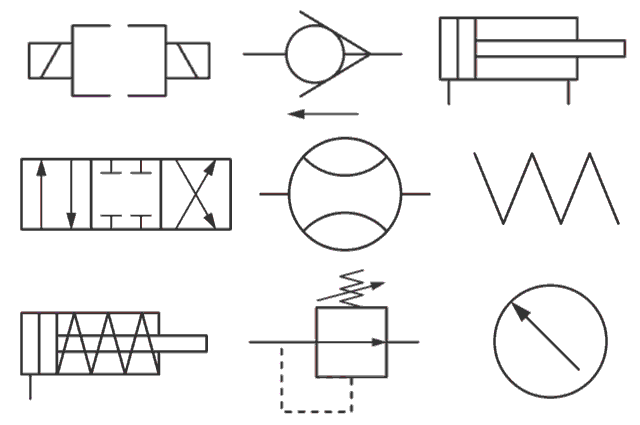Decoding Hydraulic Schematics A Fluid Power Rosetta Stone
Ever feel like you're staring at hieroglyphs when you look at a hydraulic schematic? Don't worry, you're not alone. These diagrams, packed with cryptic symbols, can seem intimidating at first. But once you crack the code, they become an invaluable tool for understanding and troubleshooting fluid power systems. Think of them as the Rosetta Stone for hydraulics, unlocking a whole new language of power and control.
Hydraulic schematics are more than just pretty pictures. They're the blueprints of any hydraulic system, detailing everything from pumps and valves to actuators and filters. These visual representations provide a standardized way to communicate complex system designs, ensuring everyone from engineers to technicians is on the same page. Imagine trying to build a house without blueprints – chaos, right? The same applies to hydraulic systems. Schematics provide the roadmap for successful design, installation, and maintenance.
So, where did these symbolic blueprints come from? The need for standardized hydraulic symbols arose with the increasing complexity of fluid power systems in the mid-20th century. Organizations like the ISO (International Organization for Standardization) stepped in to create a universal language of symbols, ensuring clear communication and preventing misinterpretations that could lead to costly errors or even dangerous situations.
The core issue with hydraulic schematics isn't the symbols themselves, but the potential for misinterpretation. A misplaced line or a misunderstood symbol can have significant consequences, leading to system malfunctions, inefficiencies, or safety hazards. That’s why a thorough understanding of these symbols is so crucial. It's not just about knowing what each symbol represents, but also understanding how they interact within the larger system context.
Let's dive into the nitty-gritty. Hydraulic schematic interpretation involves identifying individual components and understanding their function within the circuit. A simple example is the symbol for a directional control valve. It looks like a box with arrows indicating the flow path. By understanding this symbol, you can quickly grasp how the valve directs fluid flow within the system. Other common symbols include circles for pumps, rectangles for reservoirs, and triangles for actuators. Learning these basic symbols is the first step to fluency in the language of hydraulic schematics.
One major benefit of using standardized hydraulic schematic symbols is improved communication. Imagine trying to explain a complex hydraulic circuit using only words – it would be a nightmare! Symbols provide a concise and universally understood language, making it easier for engineers, technicians, and operators to collaborate effectively.
Another advantage is enhanced troubleshooting. When a system malfunctions, the schematic becomes your detective's guide. By tracing the symbols and understanding the flow of fluid, you can quickly pinpoint the source of the problem. This saves valuable time and resources, minimizing downtime and maximizing efficiency.
Finally, standardized symbols contribute to improved safety. By providing a clear and unambiguous representation of the system, schematics help prevent misinterpretations that could lead to accidents. This is especially critical in high-pressure hydraulic systems where errors can have serious consequences.
To master hydraulic schematic interpretation, start by familiarizing yourself with the basic symbols. Numerous resources are available online and in textbooks. Practice reading simple schematics and gradually work your way up to more complex designs. Hands-on experience with actual hydraulic systems is invaluable for solidifying your understanding.
Advantages and Disadvantages of Standardized Hydraulic Schematic Symbols
| Advantages | Disadvantages |
|---|---|
| Improved communication | Requires initial learning and training |
| Enhanced troubleshooting | Can be complex for extremely intricate systems |
| Improved safety | Variations in standards can sometimes cause confusion |
Five Best Practices for Implementing Hydraulic Schematic Symbols: 1. Adhere to ISO standards. 2. Clearly label all components. 3. Use consistent line weights and styles. 4. Maintain a clean and organized layout. 5. Regularly review and update schematics.
Frequently Asked Questions: 1. What is a hydraulic schematic? 2. Why are standardized symbols important? 3. Where can I find a list of hydraulic symbols? 4. How do I interpret a complex hydraulic schematic? 5. What are the common mistakes to avoid when reading schematics? 6. How can I improve my understanding of hydraulic symbols? 7. What software can I use to create hydraulic schematics? 8. What are some good resources for learning more about hydraulics?
Tips and Tricks: When analyzing a schematic, follow the flow of fluid from the pump to the actuator. Pay close attention to valve positions and control signals. Use color-coding to highlight different parts of the system. Consult with experienced hydraulic technicians if you encounter any uncertainties.
In conclusion, understanding hydraulic schematic symbols is not just a technical skill, it's a necessity for anyone working with fluid power systems. These visual blueprints provide a common language for designing, troubleshooting, and maintaining hydraulic circuits. By mastering the art of schematic interpretation, you can unlock the full potential of hydraulics, optimizing performance, ensuring safety, and contributing to a more efficient and productive work environment. So, embrace the challenge, dive into the world of hydraulic symbols, and witness the power of fluid power unfold before your eyes. Start exploring resources, practicing your interpretation skills, and connecting with experts in the field. The journey to hydraulic mastery begins with a single symbol, so take the first step today.
Ending subscriptions smartly service termination letter templates
The great lug nut conspiracy are they all the same size
Unlocking menards mason city iowa hours your diy project starts here












